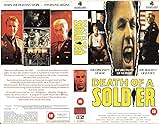Aggiungi una trama nella tua linguaBased on a true story, James Coburn portrays a military lawyer assigned to defend a confessed psychotic killer. Set in the context of WWII and the uneasy US-Australian military alliance. The... Leggi tuttoBased on a true story, James Coburn portrays a military lawyer assigned to defend a confessed psychotic killer. Set in the context of WWII and the uneasy US-Australian military alliance. The accused killer claims to have killed 3 women in order to possess their voices. Despite th... Leggi tuttoBased on a true story, James Coburn portrays a military lawyer assigned to defend a confessed psychotic killer. Set in the context of WWII and the uneasy US-Australian military alliance. The accused killer claims to have killed 3 women in order to possess their voices. Despite the defense lawyer's concerns that the killer is not fit to stand trial, the US military pre... Leggi tutto
- Regia
- Sceneggiatura
- Star
- Premi
- 2 candidature totali
- Det. Sgt. Martin
- (as Maurice Fields)
- Col. Williams
- (as John McTiernan)
Recensioni in evidenza
I would add something to Graf Spee's comment that the shootout between Australian troops and American troops was fictional. This incident was very widely believed to have really happened, by Australians in the 1950s, 60s and 70s. Books and features have been written investigating it but no concrete evidence exists that it happened. Nevertheless, people believed it had, and I recall quite a few wartime generation people of both sexes telling me in all earnestness that it had, and that it was just typical that "The Government" would cover it up. So whether true or not, the existence of the legend is an indicator of the underlying tension between Americans and Australians at the time. The Battle of Brisbane was factual, but it was a riot during which some shots were fired and people were killed. The Train Battle, legend has it, occurred when a unit of Australians, on their way to the war zone, were insulted by Americans and a full scale fire fight broke out.
One Australian attitude to Americans has been summed up as "Over-paid, Over-sexed, and Over Here", and a book about the problem has been published with that title. I just wonder if a french author has ever written a similar work about Aussie soldiers, the "Diggers" of World War One, who were paid about 7 times as much as British soldiers and much, much more than French soldiers! The wheel turns.
The movie doesn't end there, though. It shows how Eddie is used by all sides--the U.S. Army, the Australian government--to further their own agendas. The Army wants to hang him, the Australians don't want to offend the Army just at the time it needs help to fend off a possible Japanese invasion, and nobody particularly cares that Eddie is obviously insane and has no idea what he has done or what is going on around him. Reb Brown, best known as a star of low-grade action movies, is outstanding as the pathetic Eddie, never turning him into the caricature of the hulking, subhuman serial killer. He really makes you feel for Eddie. James Coburn is fine as always as the lawyer appointed to defend him, but it's Reb Brown's show, and he is up to it. It's a shame Brown never got a chance to do anything else as good as this, and it's also a shame that this film is as unknown as it is. It deserves a much wider audience than it's gotten.
The defen(s)e is intended to be pro forma.
I did like the older movie MAN IN THE MIDDLE and the Howard Fast Book upon which it was based.
I wish more Australian films like this circulated in the US.
Lo sapevi?
- QuizThis movie is based on the true story of the murders of three Melbourne women by a US Army private stationed near the city during World War II. The series of killings are known as The Brown-Out Murders while the killer, Pvt. Eddie Leonski, was known as "The Brownout Strangler" or "The Brownout Murderer". "Brown-out" was a term used during the war when people would dim the lights in their houses to reduce the chances of enemy airplanes using them as a "beacon" for aerial bombing. At the time of the murders, Melbourne was in the thick of brown-out, in which the streets were dark and shadowy.
- ConnessioniFeatured in The Spoony Experiment: Death of a Soldier (2011)
- Colonne sonoreSentimental Dreams
music by Allan Zavod
lyrics by Marty Fields
sung by Kerrie Biddell
published by Filmtrax PLC
I più visti
Dettagli
- Tempo di esecuzione1 ora 33 minuti
- Colore
- Mix di suoni
- Proporzioni
- 2.39 : 1













